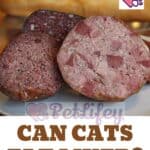
There is a very common food on our tables and inevitable in our diet: pasta, but can the cat eat this food?
Pasta is a food that is certainly not lacking on our tables, especially given the vast amount of formats available and the infinite ways to eat it, from a simple tomato sauce or with a little garlic, oil and chili pepper to very processed. In summer we also love to eat the cold version in salads or pasta omelettes.
So easily our cat will have noticed it and we are often tempted to give it but the cat can eat pasta? Let’s start by saying that pasta is not toxic for our four-legged friend even if we could have seasoned it with toxic food for the cat. If this has not been the case and our cat has ingested some we should not worry and we can avoid taking him to the vet.
Although the cat is as we all know carnivorous and therefore meat or fish is the main element of its diet, which must never be missing since it contains fundamental substances for it, in its diet we can also contain fats and carbohydrates such as pasta, whether it is made from wheat or other cereals such as rice or oats.
Can the cat eat pasta? Here are the precautions to take

However, it is important that pasta, of any type of format, is cooked properly to be more digestible for our animal. Obviously, in addition to not being seasoned with negative foods for the cat, such as garlic and onion which are deadly even in small quantities for the cat, it must not contain an excessive amount of salt which, if in small quantities is almost essential, in excess can cause pressure problems as well as promote retention in the cat: another problem linked to excess salt is the risk of sodium poisoning, which is also fatal for the cat.
Other condiments for pasta that are absolutely not recommended are those rich in fats because they can cause both an accumulation of cholesterol in the cat’s veins, with consequent obstruction of the vessels and serious risks for its health and favoring obesity, especially if the cat is sedentary enough.
Pasta, however, being a carbohydrate, in excessive quantities can promote obesity and diabetes in cats. While the human being has become accustomed to digesting and exploiting the energy deriving from complex carbohydrates, this is not the case for the cat, to whom pasta does not bring particular benefits in nutritional terms.
It should also not be substituted for more suitable foods for your health as it lacks vitamins, proteins and other substances important to your health. Obesity in cats is related to their risk of developing problems with the heart, joints, important internal organs such as the kidneys and, in the most extreme cases, some types of cancer.
If your cat is in good shape, there is no problem in rarely giving him small quantities of pasta but if he already has problems keeping his figure or is overweight or obese, pasta is strongly not recommended for him.
Summary: If your cat is fit, you can give him some pasta every now and then, even if it doesn’t have any nutrients for him, as long as it is well cooked and free of too much fatty seasonings or with garlic, onion or too much salt.






